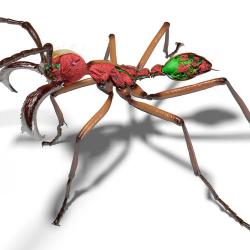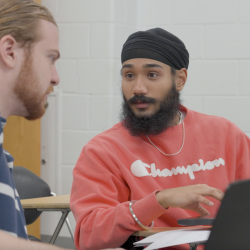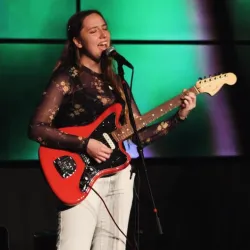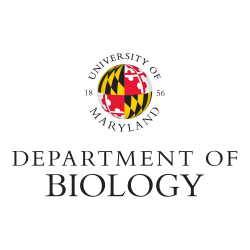College Welcomes 19 New Faculty Members this Fall
The faculty members joined nine departments in the college
The College of Computer, Mathematical, and Natural Sciences welcomed 19 new tenured/tenure-track faculty members to the University of Maryland this fall. Following are brief introductions to the new faculty members.
 Leilani Battle is an assistant professor of computer science with a joint appointment in the University of Maryland Institute for Advanced Computer Studies (UMIACS). After receiving her Ph.D. in computer science from the Massachusetts Institute of Technology (MIT) in 2017, Battle was a postdoctoral scholar at the University of Washington. She develops interactive applications that can help analysts study complex data.
Leilani Battle is an assistant professor of computer science with a joint appointment in the University of Maryland Institute for Advanced Computer Studies (UMIACS). After receiving her Ph.D. in computer science from the Massachusetts Institute of Technology (MIT) in 2017, Battle was a postdoctoral scholar at the University of Washington. She develops interactive applications that can help analysts study complex data.
 Karin Burghardt is an assistant professor of entomology. After receiving her Ph.D. in ecology and evolutionary biology from Yale University in 2016, she was a postdoctoral research fellow at the Smithsonian Environmental Research Center. Burghardt studies the ecology of insects and plants in managed environments such as suburban landscapes and forests.
Karin Burghardt is an assistant professor of entomology. After receiving her Ph.D. in ecology and evolutionary biology from Yale University in 2016, she was a postdoctoral research fellow at the Smithsonian Environmental Research Center. Burghardt studies the ecology of insects and plants in managed environments such as suburban landscapes and forests.
 Sean Carroll is the Andrew and Mary Balo and Nicholas and Susan Simon Endowed Chair in the Department of Biology. He is the first Howard Hughes Medical Institute (HHMI) investigator to take a faculty position at UMD. Carroll will continue to serve as vice president of HHMI’s Department of Science Education and as head of its film production unit Tangled Bank Studios. Carroll received his Ph.D. in immunology from Tufts University in 1983. He was a faculty member at the University of Wisconsin–Madison from 1987 to 2018, where he was also the Allan Wilson Professor of Molecular Biology, Genetics and Medical Genetics. Carroll studies the evolutionary origins of novel traits such as snake venom.
Sean Carroll is the Andrew and Mary Balo and Nicholas and Susan Simon Endowed Chair in the Department of Biology. He is the first Howard Hughes Medical Institute (HHMI) investigator to take a faculty position at UMD. Carroll will continue to serve as vice president of HHMI’s Department of Science Education and as head of its film production unit Tangled Bank Studios. Carroll received his Ph.D. in immunology from Tufts University in 1983. He was a faculty member at the University of Wisconsin–Madison from 1987 to 2018, where he was also the Allan Wilson Professor of Molecular Biology, Genetics and Medical Genetics. Carroll studies the evolutionary origins of novel traits such as snake venom.
 Tamás Darvas is an assistant professor of mathematics. Since receiving his Ph.D. in mathematics from Purdue University in 2014, he has been a postdoctoral research associate at UMD. Darvas studies differential geometry, a branch of mathematics that uses techniques from complex analysis and partial differential equations to study problems in geometry. His work has applications in theoretical physics, especially string theory.
Tamás Darvas is an assistant professor of mathematics. Since receiving his Ph.D. in mathematics from Purdue University in 2014, he has been a postdoctoral research associate at UMD. Darvas studies differential geometry, a branch of mathematics that uses techniques from complex analysis and partial differential equations to study problems in geometry. His work has applications in theoretical physics, especially string theory.
 Anahí Espíndola is an assistant professor of entomology. She received her Ph.D. in biology from the University of Neuchâtel in Switzerland in 2010. From 2011 to 2012, she was a research assistant at the University of Lausanne in Switzerland. Espíndola was both a Swiss National Science Foundation Postdoctoral Fellow from 2012 to 2015 and a National Science Foundation postdoctoral fellow from 2015 to 2018 at the University of Idaho. Espíndola uses molecular, geospatial, ecological and experimental approaches to study how changes in the composition, climate, soil and geology of an environment affect interspecies interactions, especially those of pollination species.
Anahí Espíndola is an assistant professor of entomology. She received her Ph.D. in biology from the University of Neuchâtel in Switzerland in 2010. From 2011 to 2012, she was a research assistant at the University of Lausanne in Switzerland. Espíndola was both a Swiss National Science Foundation Postdoctoral Fellow from 2012 to 2015 and a National Science Foundation postdoctoral fellow from 2015 to 2018 at the University of Idaho. Espíndola uses molecular, geospatial, ecological and experimental approaches to study how changes in the composition, climate, soil and geology of an environment affect interspecies interactions, especially those of pollination species.
 Soheil Feizi is an assistant professor of computer science with a joint appointment in UMIACS. He received his Ph.D. in electrical engineering and computer science from MIT in 2016. Prior to his UMD appointment, Feizi was a postdoctoral research scholar at Stanford University. Feizi develops methods for using artificial neural networks—computational models inspired by biological neurons—in machine learning.
Soheil Feizi is an assistant professor of computer science with a joint appointment in UMIACS. He received his Ph.D. in electrical engineering and computer science from MIT in 2016. Prior to his UMD appointment, Feizi was a postdoctoral research scholar at Stanford University. Feizi develops methods for using artificial neural networks—computational models inspired by biological neurons—in machine learning.
 Manuel Franco Sevilla is an assistant professor of physics. After receiving his Ph.D. in applied physics from Stanford University in 2012, Franco Sevilla was a postdoctoral scholar at the University of California, Santa Barbara. He conducts research in particle physics and is a member of the Large Hadron Collider beauty (LHCb) experiment team, which investigates why the universe appears to contain more matter than antimatter.
Manuel Franco Sevilla is an assistant professor of physics. After receiving his Ph.D. in applied physics from Stanford University in 2012, Franco Sevilla was a postdoctoral scholar at the University of California, Santa Barbara. He conducts research in particle physics and is a member of the Large Hadron Collider beauty (LHCb) experiment team, which investigates why the universe appears to contain more matter than antimatter.
 Anson Hook is an assistant professor of physics. He received his Ph.D. in physics from Stanford University in 2012. He was a postdoctoral scholar at the Institute for Advanced Study in Princeton, New Jersey, and at Stanford University. Hook studies theoretical particle physics with a special interest in theories beyond the standard model of particle physics. He also designs new experiments to search for evidence of dark matter.
Anson Hook is an assistant professor of physics. He received his Ph.D. in physics from Stanford University in 2012. He was a postdoctoral scholar at the Institute for Advanced Study in Princeton, New Jersey, and at Stanford University. Hook studies theoretical particle physics with a special interest in theories beyond the standard model of particle physics. He also designs new experiments to search for evidence of dark matter.
 Lise-Marie Imbert-Gérard is an assistant professor of mathematics with joint appointments in the Institute for Physical Science and Technology and in the Center for Scientific Computation and Mathematical Modeling. She received her Ph.D. in mathematics from Pierre and Marie Curie University (now Sorbonne University) in France in 2013. Imbert-Gérard was a postdoc and instructor at the Courant Institute of Mathematical Sciences at New York University before coming to UMD. Imbert-Gérard studies how certain types of waves move through different media such as plasma. This work has applications in aeroacoustics, such as the propagation of noise around airplanes.
Lise-Marie Imbert-Gérard is an assistant professor of mathematics with joint appointments in the Institute for Physical Science and Technology and in the Center for Scientific Computation and Mathematical Modeling. She received her Ph.D. in mathematics from Pierre and Marie Curie University (now Sorbonne University) in France in 2013. Imbert-Gérard was a postdoc and instructor at the Courant Institute of Mathematical Sciences at New York University before coming to UMD. Imbert-Gérard studies how certain types of waves move through different media such as plasma. This work has applications in aeroacoustics, such as the propagation of noise around airplanes.
 Adam Kanigowski is an assistant professor of mathematics. He received his Ph.D. in mathematics from the Institute of Mathematics of the Polish Academy of Sciences in 2015. He was an S. Chowla Research Assistant Professor at the Pennsylvania State University from 2015 to 2018. Kanigowski studies dynamical systems, a branch of mathematics that seeks to model physical processes that evolve over time. Dynamical systems have applications in numerous areas, including weather forecasting, economic prediction and chaos theory.
Adam Kanigowski is an assistant professor of mathematics. He received his Ph.D. in mathematics from the Institute of Mathematics of the Polish Academy of Sciences in 2015. He was an S. Chowla Research Assistant Professor at the Pennsylvania State University from 2015 to 2018. Kanigowski studies dynamical systems, a branch of mathematics that seeks to model physical processes that evolve over time. Dynamical systems have applications in numerous areas, including weather forecasting, economic prediction and chaos theory.
 Eliza Kempton is an assistant professor of astronomy. She received her Ph.D. in astronomy from Harvard University in 2009. From 2009 to 2012, she was a Sagan Postdoctoral Fellow at the University of California, Santa Cruz. Kempton was an assistant professor at Grinnell College in Grinnell, Iowa, from 2012 to 2018. Kempton characterizes planets outside our solar system and uses theory to predict and interpret their atmospheric properties, including composition, temperature and clouds.
Eliza Kempton is an assistant professor of astronomy. She received her Ph.D. in astronomy from Harvard University in 2009. From 2009 to 2012, she was a Sagan Postdoctoral Fellow at the University of California, Santa Cruz. Kempton was an assistant professor at Grinnell College in Grinnell, Iowa, from 2012 to 2018. Kempton characterizes planets outside our solar system and uses theory to predict and interpret their atmospheric properties, including composition, temperature and clouds.
 Jinwoo Lee is an assistant professor of chemistry and biochemistry. He received his Ph.D. in chemistry from Lehigh University in Bethlehem, Pennsylvania, in 2013. Lee was a postdoctoral fellow at the University of Virginia from 2013 to 2018. He studies the structure of Ebola virus proteins and how they help the virus infect human cells.
Jinwoo Lee is an assistant professor of chemistry and biochemistry. He received his Ph.D. in chemistry from Lehigh University in Bethlehem, Pennsylvania, in 2013. Lee was a postdoctoral fellow at the University of Virginia from 2013 to 2018. He studies the structure of Ebola virus proteins and how they help the virus infect human cells.
 Ming Lin is the Elizabeth Stevinson Iribe Chair of Computer Science and has a joint appointment in UMIACS. She received her Ph.D. in electrical engineering and computer science from the University of California, Berkeley, in 1993. Lin was a faculty member at the University of North Carolina at Chapel Hill from 1995 to 2017. Lin studies virtual reality, computer graphics and robotics with a focus on multimodal interaction, physically based animations and simulations, as well as algorithmic robotics and their use in physical and virtual environments.
Ming Lin is the Elizabeth Stevinson Iribe Chair of Computer Science and has a joint appointment in UMIACS. She received her Ph.D. in electrical engineering and computer science from the University of California, Berkeley, in 1993. Lin was a faculty member at the University of North Carolina at Chapel Hill from 1995 to 2017. Lin studies virtual reality, computer graphics and robotics with a focus on multimodal interaction, physically based animations and simulations, as well as algorithmic robotics and their use in physical and virtual environments.
 Jiqiang “Lanny” Ling is an assistant professor of cell biology and molecular genetics. He received his Ph.D. in biochemistry from the Ohio State University in 2008. Ling was a postdoctoral associate at Yale University from 2008 to 2013 and an assistant professor of microbiology and molecular genetics at the University of Texas Health Science Center at Houston from 2013 to 2018. He studies how cells synthesize proteins and how errors in the synthesis process lead to disease.
Jiqiang “Lanny” Ling is an assistant professor of cell biology and molecular genetics. He received his Ph.D. in biochemistry from the Ohio State University in 2008. Ling was a postdoctoral associate at Yale University from 2008 to 2013 and an assistant professor of microbiology and molecular genetics at the University of Texas Health Science Center at Houston from 2013 to 2018. He studies how cells synthesize proteins and how errors in the synthesis process lead to disease.
 Dinesh Manocha is the Paul Chrisman Iribe Endowed E-Nnovate Professor of Computer Science, with joint appointments in UMIACS and the Department of Electrical and Computer Engineering. Manocha received his Ph.D. in computer science from the University of California, Berkeley, in 1992. Prior to arriving at UMD, Manocha was a faculty member at the University of North Carolina at Chapel Hill from 1992 to 2018. His research interests include geometric and scientific computing with applications to computer graphics, robotics, autonomous driving and virtual reality.
Dinesh Manocha is the Paul Chrisman Iribe Endowed E-Nnovate Professor of Computer Science, with joint appointments in UMIACS and the Department of Electrical and Computer Engineering. Manocha received his Ph.D. in computer science from the University of California, Berkeley, in 1992. Prior to arriving at UMD, Manocha was a faculty member at the University of North Carolina at Chapel Hill from 1992 to 2018. His research interests include geometric and scientific computing with applications to computer graphics, robotics, autonomous driving and virtual reality.
 Peter Nemes is an associate professor of chemistry and biochemistry. He received his Ph.D. in analytical chemistry from the George Washington University in 2009. Nemes was a postdoctoral fellow at the University of Illinois at Urbana-Champaign from 2009 to 2011, a staff fellow at the Food and Drug Administration from 2011 to 2013, and an assistant professor at the George Washington University from 2013 to 2017. Nemes develops next-generation mass spectrometry techniques to determine the role of biological molecules—such as proteins, peptides and metabolites—as cells become specialized tissues in the early embryo and in the nervous system.
Peter Nemes is an associate professor of chemistry and biochemistry. He received his Ph.D. in analytical chemistry from the George Washington University in 2009. Nemes was a postdoctoral fellow at the University of Illinois at Urbana-Champaign from 2009 to 2011, a staff fellow at the Food and Drug Administration from 2011 to 2013, and an assistant professor at the George Washington University from 2013 to 2017. Nemes develops next-generation mass spectrometry techniques to determine the role of biological molecules—such as proteins, peptides and metabolites—as cells become specialized tissues in the early embryo and in the nervous system.
 Jonathan Poterjoy is an assistant professor of atmospheric and oceanic science. He received his Ph.D. in meteorology from the Pennsylvania State University in 2014. Prior to his UMD appointment, Poterjoy held postdoctoral positions at the National Center for Atmospheric Research, the Cooperative Institute for Mesoscale Meteorological Studies, and the National Oceanic and Atmospheric Administration. Poterjoy develops methods for weather prediction and forecasting, with a focus on tropical cyclones and severe thunderstorms.
Jonathan Poterjoy is an assistant professor of atmospheric and oceanic science. He received his Ph.D. in meteorology from the Pennsylvania State University in 2014. Prior to his UMD appointment, Poterjoy held postdoctoral positions at the National Center for Atmospheric Research, the Cooperative Institute for Mesoscale Meteorological Studies, and the National Oceanic and Atmospheric Administration. Poterjoy develops methods for weather prediction and forecasting, with a focus on tropical cyclones and severe thunderstorms.
 William Regli III (M.S. ’94, Ph.D. ’95, computer science) is a professor of computer science and the sixth director of the Institute for Systems Research. Regli was a faculty member at Drexel University from 1997 to 2018. He was also acting office director and deputy office director of the Defense Sciences Office of the Defense Advanced Research Projects Agency from 2017 to 2018 and 2014 to 2017, respectively. His research interests include 3D printing systems, computational tools to exploit the properties of advanced materials, and new systems and frameworks for design and production.
William Regli III (M.S. ’94, Ph.D. ’95, computer science) is a professor of computer science and the sixth director of the Institute for Systems Research. Regli was a faculty member at Drexel University from 1997 to 2018. He was also acting office director and deputy office director of the Defense Sciences Office of the Defense Advanced Research Projects Agency from 2017 to 2018 and 2014 to 2017, respectively. His research interests include 3D printing systems, computational tools to exploit the properties of advanced materials, and new systems and frameworks for design and production.
 Abhinav Shrivastava is an assistant professor of computer science with a joint appointment in UMIACS. Shrivastava received his Ph.D. in robotics from Carnegie Mellon University in 2017. Prior to his UMD appointment, Shrivastava was a visiting research scientist at Google Research (now Google AI). He studies computer vision and machine learning with the goal of equipping machines with visual perception abilities, thus enabling the machines to understand and respond to their surroundings.
Abhinav Shrivastava is an assistant professor of computer science with a joint appointment in UMIACS. Shrivastava received his Ph.D. in robotics from Carnegie Mellon University in 2017. Prior to his UMD appointment, Shrivastava was a visiting research scientist at Google Research (now Google AI). He studies computer vision and machine learning with the goal of equipping machines with visual perception abilities, thus enabling the machines to understand and respond to their surroundings.
###
Media Relations Contact: Irene Ying, 301-405-5204, zying@umd.edu
University of Maryland
College of Computer, Mathematical, and Natural Sciences
2300 Symons Hall
College Park, MD 2074
www.cmns.umd.edu
@UMDscience
About the College of Computer, Mathematical, and Natural Sciences
The College of Computer, Mathematical, and Natural Sciences at the University of Maryland educates more than 9,000 future scientific leaders in its undergraduate and graduate programs each year. The college’s 10 departments and more than a dozen interdisciplinary research centers foster scientific discovery with annual sponsored research funding exceeding $175 million.






